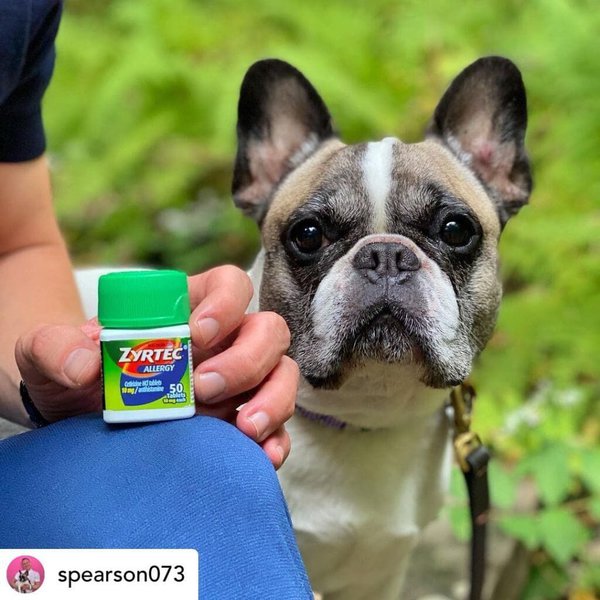Zyrtec is a prescription medicine that is commonly used to relieve the symptoms of allergic reactions in humans. And the effectiveness of Zyrtec in treating humans has led to several dog owners wondering whether this drug is safe for use on their canine buddies.
So, can you give dogs Zyrtec? Yes, Zyrtec can be safely used on dogs. And as a matter of fact, Zyrtec is one of the safest over-the-counter medications for pooches, with a wide safety margin, in case of an overdose and the presence of little to no side effects.
We’ve determined that Zyrtec is safe to use in dogs, but what medical conditions warrant the use of this antihistamine on our canine buddies, and what amount of this drug can be safely used on dogs?
Answers to these questions, as well as information on some of the possible side effects associated with the usage of this drug, are contained in the article. However, before we go further, let’s see why Zyrtec is an effective treatment method for pooches.
Can You Give Zyrtec To Dogs?

Zyrtec is safe for dogs to use as long as it is administered in the prescribed dosage and under a vet’s guidance.
Zyrtec (brand name for the generic medicine, Cetirizine) is an antihistamine that is typically used to treat several medical issues, ranging from itchiness to insect bites, in dogs. Zyrtec is not FDA-approved for use in dogs, but vets generally prescribe it as an ‘extra-label drug.’
That said, not all forms of Zyrtec are safe for dog use. And when purchasing this drug for use on your pooch, you must avoid products labeled as Zyrtec-D.
Zyrtec-D products usually contain pseudoephedrine, which is a decongestant that is typically administered to humans and which can be extremely dangerous when used on dogs.
Why Is Zyrtec Effective For Dogs?
During an allergic reaction in a dog, the pooch’s body typically releases chemicals called histamines, which subsequently travel across the dog’s body to serve as protection against the perceived threat. And this, in turn, results in the symptoms that are generally associated with allergic reactions in dogs.
Antihistamines, such as Zyrtec, are effective at combating these symptoms of allergic reactions in dogs because they bind to histamine receptors, thereby blocking their actions and preventing the development of side effects by a pooch.
Additionally, Zyrtec is commonly prescribed for use on dogs because it is a second-generation antihistamine, which means that it doesn’t induce the drowsiness that is typical with other antihistamines.
How Much Zyrtec Can I Give My Dog?
Generally, vets prescribe Zyrtec tablets for dogs to be administered orally once per day. The exact amount of Zyrtec tablets your canine buddy needs will depend on the pooch’s size, with the recommended dosage typically starting at 0.5 mg of cetirizine per pound of the dog’s body weight.
Apart from being available in tablet form, Zyrtec also comes in a liquid form that is administered either with the aid of a syringe or dropper. It is also possible to administer liquid Zyrtec by spreading it directly over the pooch’s food.
However, to ensure your canine buddy’s continued safety, do not administer over-the-counter medication such as Zyrtec to the pooch without properly consulting a vet.
What Is Zyrtec Used For In Dogs?

Zyrtec is generally prescribed as a treatment for symptoms of allergic reactions such as itching and insect bite reactions on dogs.
Treating Symptoms Of Allergic Reactions
As mentioned earlier, Zyrtec is an antihistamine, which means that this drug effectively alleviates the symptoms of an allergic reaction in dogs, most especially itching.
Allergy management in dogs is important because, when not properly controlled, the itching and irritation that accompany allergic reactions can go on to trigger secondary skin infections, loss of hair, and a host of other health complications.
Effective At Treating Atopic Dermatitis
Atopic dermatitis in dogs is a chronic and inflammatory skin disease typically associated with dogs’ skin allergies. And according to a published study, the use of Cetirizine contained in Zyrtec will effectively alleviate the itching associated with this skin condition.
Can Zyrtec Be Bad For Dogs?
Zyrtec is generally safe for dogs to use, but the administration of human-grade Zyrtec on a pooch can result in the development of health complications.
Side Effects
When administered in the right dosage, Zyrtec is relatively safe for dogs to use, with there being little to no side effects reported in the majority of the dogs this drug is administered on.
Also, dogs have an extremely high tolerance for Zyrtec, so in most cases, overdosing on this drug will likely cause no harm to a pooch.
That said, despite the rarity of side effects associated with Zyrtec use, this drug isn’t without its problems. And some of the side effects that may be observed with Zyrtec use include:
- Lethargy
- Excessive salivation
- Vomiting
- Hyperactivity
- Constipation
- Difficulty urinating
Additionally, Zyrtec is generally not prescribed for use on pregnant or breastfeeding dogs because there is little to no research available on the possible side effects of the use of this drug on these groups of dogs.

Use Of Human-Grade Zyrtec
Zyrtec-D is a variant of Zyrtec that is commonly used to treat congestion in humans, but the administration of this drug to a dog can be potentially fatal.
The letter ‘D’ in Zyrtec-D indicates the presence of the decongestant, pseudoephedrine. And when applied to a dog, this decongestant tends to overstimulate the pooch’s central nervous system and heart, which in turn results in the development of seizures, heart failure, and potentially, death!
Interaction With Other Drugs
Apart from inducing side effects in dogs, there is also the possibility of Cetirizine contained in Zyrtec interacting with certain medication, and this can be dangerous for the dog that this antihistamine is administered on.
Some of these drugs that Zyrtec may interact with include:
- Anti-anxiety medications such as alprazolam and diazepam
- Muscle relaxers such as carisoprodol
- Oral or topical antihistamines
- Blood pressure medication such as digoxin
Consequently, if your pooch is using any of the drugs listed above, it is advisable that you consult your vet to prescribe a safer alternative to Zyrtec for the Fido.





